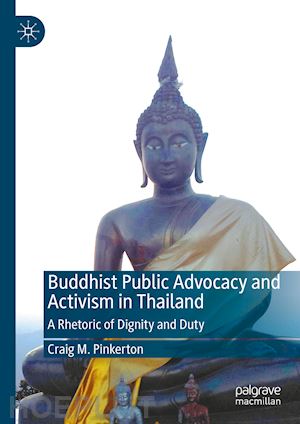
Questo prodotto usufruisce delle SPEDIZIONI GRATIS
selezionando l'opzione Corriere Veloce in fase di ordine.
Pagabile anche con Carta della cultura giovani e del merito, 18App Bonus Cultura e Carta del Docente
This book studies Buddhist public advocacy and activism in Thailand—a movement often broadly called socially engaged Buddhism—from the perspective of rhetorical studies, specifically, on humanizing and dehumanizing communication practices. In modern Thailand and historical Siam, Buddhism has been integral to the social change processes shaping civil society and an emerging democracy. This study examined two problems: How do contemporary Buddhists in Thailand use rhetorical practice to influence the way the issues they work on are understood, and how do these Buddhists justify their advocacy and activism in rhetorical practice? To the first, a rhetoric of dignity, or humanization, was the central answer. To the second, a rhetoric of duty was the central answer. For researchers in Southeast Asian Studies, Thai Studies, and Buddhist Studies, this book offers a fresh perspective on socially engaged Buddhism through the lens of the communication discipline. For researchers in Psychologyand Communication, it sheds light on the understudied practices of humanizing communication. The bulk of the current research is focused on its opposite—dehumanization—and most of this literature is in the field of psychology even though humanization and dehumanization are fundamentally and ontologically communication phenomena. For researchers within the field of Communication and Rhetorical Studies, this book advances innovations in the emerging practices of rhetorical field methods by applying rhetorical criticism to interview data in a new way and provides a non-western perspective on communication and rhetorical theory for which there has been continual calls.
1. Introduction.- 2. Buddhist Advocacy and Activism Research.- 3. Historical Developments of Buddhist Advocacy and Activism in Siam and Modern Thailand.- 4. Identification and Humanizing and Dehumanizing Rhetoric.- 5. A Buddhist Rhetoric of Dignity and Degradation.- 6. A Buddhist Rhetoric of Duty: Justifying Advocacy and Activism.- 7. Conclusion.
Craig M. Pinkerton (Ph.D., Ohio University) is Visiting Assistant Professor in the Department of Communication at Denison University. He is an educator and researcher of communication with an emphasis in rhetoric, public culture, and qualitative methods combined with interdisciplinary inquiry in Southeast Asian Studies and Buddhist Studies. He has won over fifteen academic awards and honors, including the prestigious Foreign Language and Area Studies Fellowship (FLAS) for the study of Thai language. Since 2007, he has taught over 20 courses on a wide variety of subjects on communication, including public speaking and presentation communication, argumentation, rhetoric, public advocacy and activism, marketing and public relations, organizational development, interpersonal conflict management, and the dark side of media. From 2011 to 2015, he lived in Thailand teaching communication and researching Buddhist public advocacy and activism.











Il sito utilizza cookie ed altri strumenti di tracciamento che raccolgono informazioni dal dispositivo dell’utente. Oltre ai cookie tecnici ed analitici aggregati, strettamente necessari per il funzionamento di questo sito web, previo consenso dell’utente possono essere installati cookie di profilazione e marketing e cookie dei social media. Cliccando su “Accetto tutti i cookie” saranno attivate tutte le categorie di cookie. Per accettare solo deterninate categorie di cookie, cliccare invece su “Impostazioni cookie”. Chiudendo il banner o continuando a navigare saranno installati solo cookie tecnici. Per maggiori dettagli, consultare la Cookie Policy.